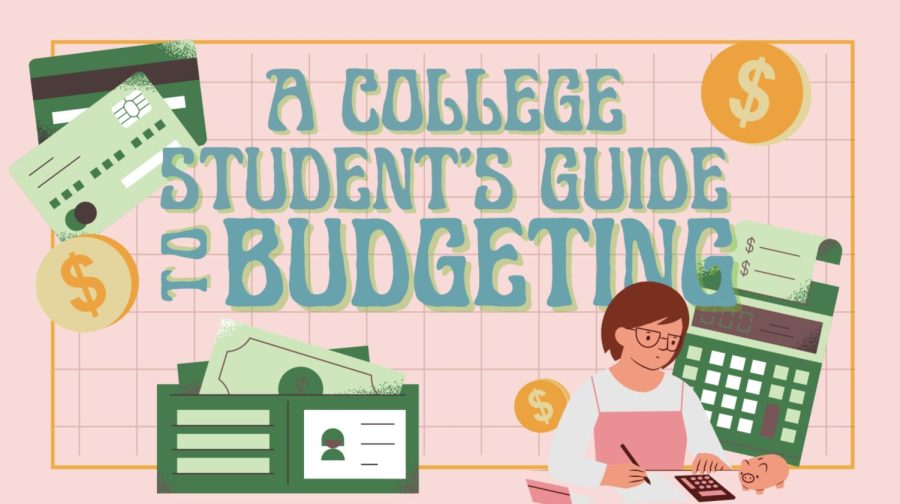A college student’s guide to budgeting
Budgeting is hard. Here are some tips and tricks on how to better manage your money. (Graphic by Maliah White)
January 25, 2023
Everyone has heard of budgeting, but what does it really mean to keep a budget?
Many students may not have a budget or struggle to stick to budgeting. Some may not understand the point of having a budget at all. Although college can be a financially stressful time, sticking to certain budgeting strategies can help students to both save and make the most out of their money.
What is a budget?
“A budget is our way of winning with money and taking control of our financial situation,” said Shawn Robey, student financial success specialist. “And in order to do that, we have to make our money behave. We have to put our money on paper on purpose before the month begins, or else we get to the end of the month, and our money’s all gone, and we’ll have no idea where it went.”
To put it in simple terms, Mark McKnight, professor of accounting, said, “A budget is a plan for tracking your income and expenses.”
Why is it important?
With all the responsibilities that come with being a college student, many students probably think they don’t have time for budgeting or they don’t make enough money to budget. The reality is it’s important for everyone to learn how to budget no matter what stage of life they’re in.”
“Budgeting is important for everyone — especially college students,” McKnight said. “Many college students are learning to manage money and cover their own expenses for the first time, so that becomes a great opportunity to build healthy financial habits, including budgeting. Generally, most students do not have unlimited resources, so planning and using money effectively is essential to be able to pay for living expenses as well as tuition, books and other education-related expenses.”
Roby said, “Regardless of your major, we should all know how to manage our money. A budget is a key component to helping students achieve their personal and financial goals.”
“It is important to keep a budget while in college for multiple reasons,” said Cathy Carey, professor of accounting.
Carey said it is important to decide how much money students should spend on things such as groceries, housing and transportation, or else it will be difficult for them to stick to their budget. “It may be difficult to save while in college, which is understandable,” she said. “But it is not impossible.”
“I hear all the time from students and even people outside of university, ‘I don’t make enough money to budget,’” Robey said.“Well, if you budget, you cut out careless spending, and you tell your money what to do. I also hear from people saying, ‘I’ll budget when I make more money.’ No, you won’t. You’ll make more money, and you’ll make more mistakes.”
Strategies and mistakes
The Student Financial Success Center provides students with peer mentoring and support services. SFSC helps students learn financial literacy to promote student retention and success. When learning how to budget, clients of SFSC have two main options: Excel or the Every Dollar app. The SFSC also teaches the envelope system, a budgeting approach for variable expenses..
When using the Excel approach, students use a Microsoft Excel sheet to document every time they spend money.. Students input what they spent based on the category on the corresponding day so they can see what they’ve actually spent, what they’ve budgeted, what they have left in that specific category and what they have left over for the overall month. While this approach is not as convenient as the Every Dollar app, Robey said he highly recommends the Excel approach for students.
The Every Dollar app is a more convenient approach, as it gives students direct access to their budgets on their phones. It works similarly to the Excel approach, with the app documenting every time you spend money and calculating how much is left over to budget. Additionally, if students pay for the premium version, they can connect their checking account to the app, which will update their budget for them.
A third approachis the envelope system. The envelope system is typically used for variable expenses, costs that can vary from month to month such as food and gas. It’s also useful for areas where students tend to overspend. Students put a specific amount of money in an envelope for a certain variable expense for the month, and that’s how much money they get to spend on that expense. Once the money is spent for the month, no more can be spent on that variable expense. However, if there is money left over in another envelope, the leftover money can be put to a different expense. This system helps reduce variable expenses for the month.
Robey also offers a fourth approach of his own.
“What I like to do is to help students get their emergency fund established as soon as possible,” Robey said. “How much are we needing per month? Let’s say they need 500. So we take 500 out of that emergency fund at the beginning of the month. So when they work, their paychecks go to replenish their savings. So they have all of their money at the beginning of the month.”
Robey said students knowing and planning how much money they want to spend for the month helps them become more successful with their money.
While the different strategies for budgeting make it look more approachable, becoming a successful budgeter does not happen overnight.
“First, remember that this is a learned skill,” McKnight said. “Most folks don’t master it right away. Get help — there are resources both inside and outside the university to help folks learn to be more effective with their personal finances.”
“Some terrible budgeters get lucky,” Carey said. “They may not budget, but they don’t overdo. Others could leave college with mountains of credit card and loan debt that will weigh them down for many years to come, and I’m not judging. I made some of those mistakes myself while in college.”
Robey says that it’s normal for people to learn the skill of budgeting over a long period of time.
“It takes about three to six months,” Robey said. “Whenever my wife and I first started budgeting, I was close to the six-month mark. So, if I can get students closer to three, they’re going to be more likely to stick with the budgeting.”
Everyone is going to make mistakes when it comes to budgeting, but there are some common mistakes that beginner budgeters can be sure to avoid.
One of the most common mistakes students make is underestimating their variable expenses.
“When they actually see them, they want to dramatically reduce, and that causes a negative impact on the budgeting process going forward,” Robey said.
Robey said overspending on something like food “could result in nonsufficient funds that have fees.”
“Mobile apps for banks and credit unions are often the only thing that students use to track their money,” McKnight said. “That’s a mistake. Mistakes happen, and having your own financial records is one way to reduce and/or correct those kinds of issues.”
Credit cards and negotiating
Credit cards can also be risky when it comes to budgeting. If a person doesn’t understand the purpose of a credit card or how it works, they could land themselves in some serious debt.
“I think people need to understand credit cards are not an extension of their wealth,” Robey said. “So if your credit card limit is $500, that doesn’t mean you have $500 more. That means if you spend $500, you have to eventually pay that back.”
“The biggest con about a credit card is that it is easy to lose control of your spending,” Carey said. “It’s like always having money readily available. But it’s not money. Money is an asset. A credit card is a liability. It is a quick way to take out a very expensive loan. High balances mean high-interest payments which means harder to pay off.”
With the risk of quickly racking up fees, irresponsible use of a credit card can result in paying more for things than you usually would. However, credit cards are useful in determining a good or bad credit score.
Robey said a credit score is a “gauge of riskiness” for banks and other institutions when it comes to loans. It shows how well you manage your money. If you have a high credit score, you’re more likely to buy a car or a house with a good interest rate. If you have a low credit score, you’ll have a higher interest rate because you’re a higher risk. However, having no credit can be just as bad as having low credit.
“Guard your credit score,” Carey said. “Build a good one and maintain it. It will impact your ability to get virtually any kind of loan and the interest rate you will pay. Always make payments on time. Try to keep a low balance-to-credit limit ratio. Don’t apply for too many credit cards or loans, since every time you do, your credit score is impacted.”
“If we’re using credit cards or debit cards, plastic in general, we tend to spend more money than we would if we use cash,” Robey said.
Negotiation can also be a useful tool when it comes to budgeting. Typically, it happens when you decide to pay with cash instead of credit for bigger purchases like utilities or cars.
“Having cash sometimes gives you that leverage,” Robey said. “Some places will actually give you discounts for paying cash for things because they don’t have to pay the 2-3% card fees and the fees that are charged, so they’ll maybe give you a 3% discount.”
“Sometimes, people just seeing money helps them maybe make a different decision,” Robey said.
Although students may not use negotiating in their day-to-day lives, it’s still a useful tool for saving money on some of life’s bigger purchases and knowing how to get the most out of your money.
“It’s so fun whenever you have the money to then go and negotiate,” Robey said. “You go there, and then you negotiate, and you get what you want for cheaper, and you’re not paying interest on it. It’s already paid off.”
Resources
To learn several financial skills, students can enroll in courses such as FIN 101 Money Skills and FIN 208 Personal Financial Management.
Students can do a pre-semester check-in with SFSC to help manage their finances before the semester begins. With SFSC, student can fill out their major, housing, meal plan, credit hours, the level of the courses and their tuition cost and know how much money they’ll owe that semester. The center also shows students different payment plan options that can help them know if they can afford what they have chosen for the semester.
“At your meeting, versus saying, oh, I think I can afford it, you’ll know if you can,” Robey said.
Other finance resources include websites such as SmartAsset, Moneygeek and Financial Calculators.
Budgeting isn’t learned overnight, but it’s better to start late than to never start at all. College is a great time to learn how to budget, even if students aren’t making or spending much money at all. he more students learn how to better manage their money now, the less financial stress will follow them later.
“It’s all about building good habits,” McKnight said. “The impact of avoiding, reducing or eliminating debts now can influence how soon students will one day be able to start families, purchase homes, et cetera.”








